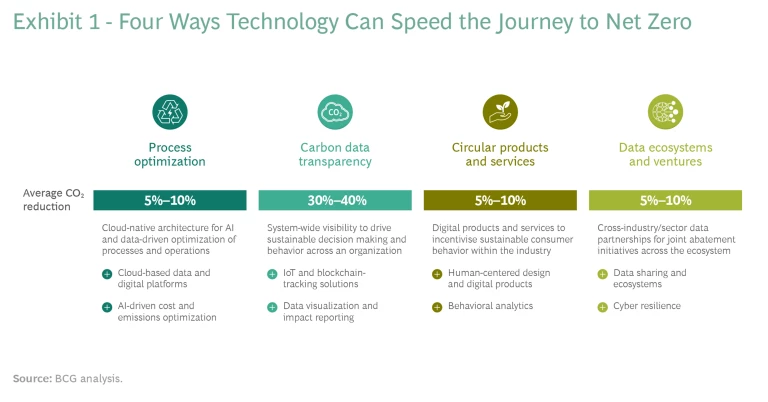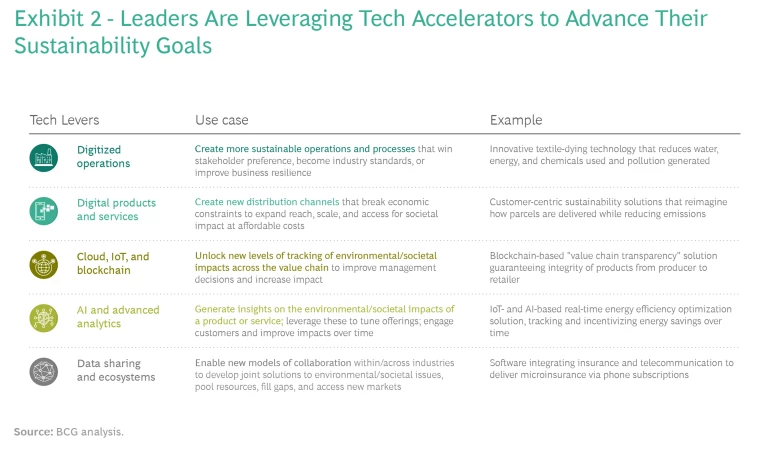Twentieth Century technology, specifically mechanization and other industrial processes, got us into the climate change conundrum. Can 21st Century data and digital technology help us get out of it?
Leading companies understand that achieving ambitious sustainability goals requires a systemic approach to transformation —one that takes a 360-degree view of the challenge. Building sustainability as a competitive advantage, however, requires integrating technology and data from the very beginning.
The role of tech goes well beyond “green IT.” As more companies think about their technology and sustainability agendas in concert, management teams should ask whether they are bringing game-changing technology and digital thinking to the task of meeting sustainability goals—or whether this critical business issue is missing an important dimension.
The Technology Ecoadvantage
For companies willing to think broadly about how to advance their sustainability initiatives, technology can act as a major accelerant. We call this mindset “technology ecoadvantage”—using advanced technologies and ways of working to enable profitable solutions that also have a positive impact on net zero and other environmental, social, and governance goals .
Take the example of achieving net-zero GHG emissions. Our experience shows that for an organization of about 80,000 people, the combination of process automation, carbon data transparency, circular product or service design, and sustainable business models can reduce emissions by 45% to 70% . (See Exhibit 1.)

Such initiatives can yield substantial cost savings as well. A leading European minerals company, for instance, used a digitally enabled energy control tower with a cloud-enabled data platform and AI and advanced analytics to create an end-to-end model for an integrated energy management solution. As a result, it achieved a reduction in energy consumption of 5% to 10% and is on track to save €8 million to €9 million a year in costs. There are already well-developed use cases for digital decarbonization in multiple industries, including electricity, oil and gas, automotive , consumer goods , finance, and pharmaceuticals .
A big benefit of the technology ecoadvantage mindset is that companies can set a roadmap for new tech adoption that will speed the journey to sustainability by helping to embed it as a core value. The key to implementation is rethinking traditional approaches to technology—particularly in the areas of digitized operations; digital product and service design; cloud computing, IoT, and blockchain; applying AI and advanced analytics; and data sharing and ecosystem building and management.
There are a number of examples that showcase how leaders have effectively leveraged these new approaches to technology to accelerate their sustainability transformations. (See Exhibit 2.)

Digitized Operations. Frontrunners in this area create inherently more sustainable operations and processes—for example, new manufacturing or materials technologies that leverage alternative inputs to reduce emissions and waste—and win consumer and investor reward as a result. Digitized operations also can improve business resilience; some of the processes and technologies involved even become industry standards. Schneider Electric transformed itself from an installer of industrial electrical equipment to a global leader in efficiency-as-a-service, generating revenues from reducing customers’ CO2 emissions. The greater the environmental and social impact that Schneider creates through energy savings and emissions reductions, the more it is financially rewarded by customers and the faster its business expands.
Digital Products and Services. Leading companies create new distribution channels that break economic constraints to expand reach, scale, and access for beneficial societal impact at affordable costs. Apps that digitize and facilitate access to essential goods and services are one example. A major city transportation authority designed three customer-centric sustainability solutions that reimagined how parcels are delivered while reducing emissions, transforming the customer experience, and delivering sustainable growth and profit.
Cloud, IoT, and Blockchain. Advanced digital technologies and tools—such as connected IoT sensors and monitors, cloud-based data platforms, and blockchain-enabled tracking systems—unlock new capabilities for the measurement and tracking of environmental and social impact across value chains. Companies, in turn, can better improve management and investment decisions and improve their performance against ESG goals. For example, value chain transparency solutions that use blockchain technology guarantee the integrity and safety of products from supply source to producer to retailer to consumer.
AI and Advanced Analytics. These technologies generate data and insights on the environmental and social impact of a product, service, or process. Digital platforms integrate capabilities, share data, and create transparency and accountability among partners. Frontrunners leverage these capabilities to develop and finetune offerings, engage customers, and improve performance over time; IoT - and AI-based solutions also optimize energy efficiency in real time, reducing emissions and saving money all at once.
In Brazil, Nubank is using such solutions to accelerate financial inclusion for the country’s 55 million unbanked consumers. With its fully digital model, Nubank uses unique data sources and algorithms to build a financial picture of potential customers, providing them with access to credit with no fees and at 50% lower interest rates than traditional banks.
Data Sharing and Ecosystems. Data sharing enables new models of collaboration within or across industries or sectors to develop novel solutions to environmental and social issues. Companies can more easily pool resources, fill capability gaps, access new markets, and expand reach. For example, software platforms that integrate insurance underwriters and telecommunications providers can deliver microinsurance via phone subscriptions to underserved populations.
BCG research into the impact of data sharing on big societal challenges has shown that data sharing generates value in five ways: enabling innovation, creating trust, facilitating coordination, raising awareness, and validating hypotheses. Fertilizer producer Yara is developing a new business unit to become an IoT and digitally enabled “smart agriculture” leader that improves sustainability by reducing the need for chemical fertilizers by up to 90%. New science based on data the company collects informs the development of next-generation regenerative crop-nutrition solutions.
Taking an Early Technology-Led Approach
In 2020, BCG examined 300 corporate sustainability initiatives. Of these, 85 were cases of sustainable business model innovation (SBM-I) that generated both societal and business value . Half of these companies used innovations in products or processes, or changes to the value chain, to mitigate negative environmental impact. Another 25% reimagined value chains and business ecosystems, attempting to address the root causes of environmental and societal needs. The top 25% successfully reimagined their business entirely—reshaping the boundaries of competition to address the root causes at scale for growth and advantage.
A key differentiator for these frontrunner companies was using digital capabilities and technologies to break economic constraints and unlock new solutions. But success depends on leveraging technology and data from the very start. Before making a major commitment of time, management energy, and company resources, management should take a forward-looking and strategic view of how advanced technology and data can accelerate the journey to sustainability advantage.







